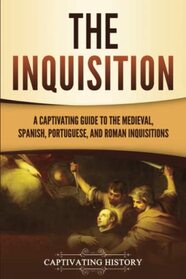This book starts with the information that Muslims, Christians, and Jews coexisted in peace throughout the Iberian Peninsula for generations. Over time, the Christians began to worry about the heretics. This led to the earliest Inquisition.
Medieval Inquisition: Catholics considered the Cathars as heretical because they believed humans were angels trapped here by an angry god. Cathars also believed in the form of reincarnation and two gods (the Good God of the New Testament and the evil God of the Old Testament). However, this early Inquisition wanted to convert the heretics, not burn them. Thus, there were fewer deaths than in later Inquisitions. This Inquisition lasted from 1184 to 1240 CE.
Spanish Inquisition: This Inquisition lasted longer (from 1478 to 1834 CE) and is the most famous of the four Inquisitions. Ferdinand and Isabella had just reconquered the Iberian Peninsula from the Muslims and were nervous that the Jews would join the Muslims to take back Spain.
They forced the Jews to leave the country or convert to Catholicism. Later, they forced Muslims to convert or leave the country. Not taking people at their word, neighbors turned in people they thought were still practicing their old religion. People learned to admit to minor sins because denying any wrongdoing would bring torture to the unfortunate person being questioned. This lasted almost 400 years! Conservative estimates are that 300,000 people died during this Inquisition.
Portuguese Inquisition: As nautical traders, the Portuguese gained footholds in India, Pakistan, South America, and Africa. Their Inquisition began in 1536 and ended in 1821. The Portuguese started with the Hindus of India and the Muslims of Pakistan. Later, the Portuguese went after the Nestorian Christians living in India. These Christians were Orthodox Christians, not Catholics. Thus, the Portuguese went after these Christians too.
Just like the Spanish, the Portuguese did not trust the conversion of these Hindus, Muslims, and Orthodox Christians. They constantly tested the transformations of these people. Later, they went after the Buddhists, not allowing them to practice their faith. Then, the Portuguese went after orphan children, forcing conversion on children without parents.
Roman Inquisition: In the 16th century, Rome was part of the Papal States. These lands were reeling from the Protestant Reformation and the Catholic Counter-Reformation. As countries became Protestant or Catholic, the Catholic Church desired to reassert its mastery. Their Inquisition began in 1542 and ended before 1800 CE. This policing of Christians took place more quietly than the other Inquisitions. Even someone as famous as Galileo was called before the tribunal for teaching that the earth moved around the sun. Galileo barely squeaked by the tribunal with his life.
The last chapters of this book covered the papal involvement and impact of the Inquisition. The author's summation includes the view that intolerance rears its ugly head whenever we are not vigilant. He cites the McCarthy years (chasing Russians in America) as a point. This is certainly a thought-provoking book.
Medieval Inquisition: Catholics considered the Cathars as heretical because they believed humans were angels trapped here by an angry god. Cathars also believed in the form of reincarnation and two gods (the Good God of the New Testament and the evil God of the Old Testament). However, this early Inquisition wanted to convert the heretics, not burn them. Thus, there were fewer deaths than in later Inquisitions. This Inquisition lasted from 1184 to 1240 CE.
Spanish Inquisition: This Inquisition lasted longer (from 1478 to 1834 CE) and is the most famous of the four Inquisitions. Ferdinand and Isabella had just reconquered the Iberian Peninsula from the Muslims and were nervous that the Jews would join the Muslims to take back Spain.
They forced the Jews to leave the country or convert to Catholicism. Later, they forced Muslims to convert or leave the country. Not taking people at their word, neighbors turned in people they thought were still practicing their old religion. People learned to admit to minor sins because denying any wrongdoing would bring torture to the unfortunate person being questioned. This lasted almost 400 years! Conservative estimates are that 300,000 people died during this Inquisition.
Portuguese Inquisition: As nautical traders, the Portuguese gained footholds in India, Pakistan, South America, and Africa. Their Inquisition began in 1536 and ended in 1821. The Portuguese started with the Hindus of India and the Muslims of Pakistan. Later, the Portuguese went after the Nestorian Christians living in India. These Christians were Orthodox Christians, not Catholics. Thus, the Portuguese went after these Christians too.
Just like the Spanish, the Portuguese did not trust the conversion of these Hindus, Muslims, and Orthodox Christians. They constantly tested the transformations of these people. Later, they went after the Buddhists, not allowing them to practice their faith. Then, the Portuguese went after orphan children, forcing conversion on children without parents.
Roman Inquisition: In the 16th century, Rome was part of the Papal States. These lands were reeling from the Protestant Reformation and the Catholic Counter-Reformation. As countries became Protestant or Catholic, the Catholic Church desired to reassert its mastery. Their Inquisition began in 1542 and ended before 1800 CE. This policing of Christians took place more quietly than the other Inquisitions. Even someone as famous as Galileo was called before the tribunal for teaching that the earth moved around the sun. Galileo barely squeaked by the tribunal with his life.
The last chapters of this book covered the papal involvement and impact of the Inquisition. The author's summation includes the view that intolerance rears its ugly head whenever we are not vigilant. He cites the McCarthy years (chasing Russians in America) as a point. This is certainly a thought-provoking book.




